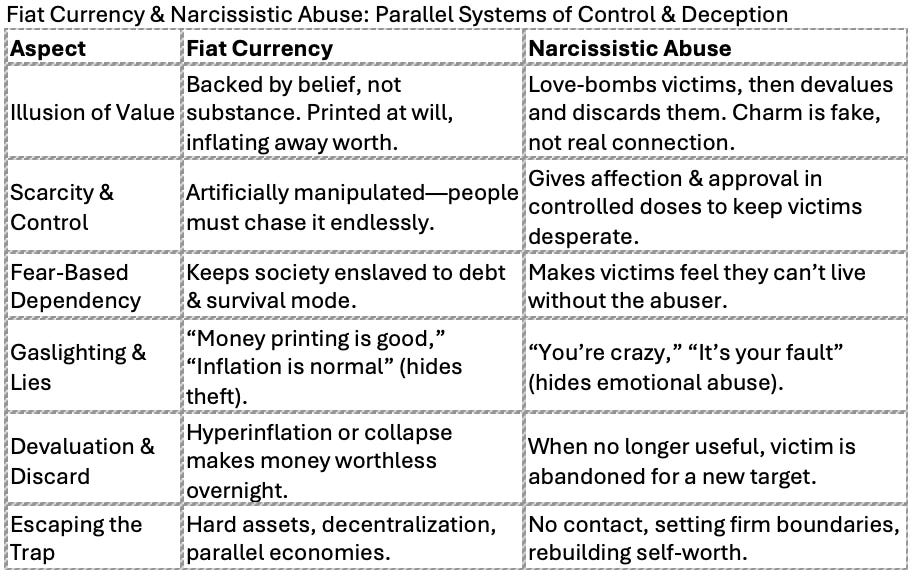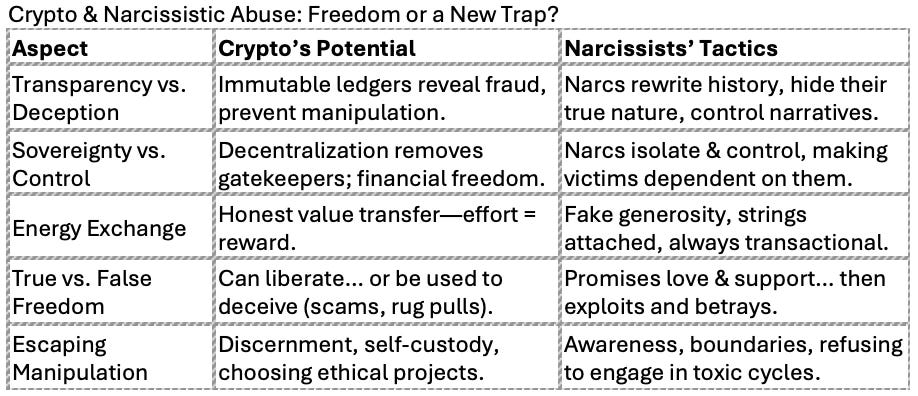The spirit of crypto
An exploration of how spirituality and distributed ledger technology may intersect
Back in March I gave a talk in London at a Crypto Wednesdays meetup. The legal madness I have been embroiled in on both sides of the Atlantic has sucked away energy from writing up pieces on themes beyond familial child trafficking, jurisdiction fraud, and ghost courts. To remedy this, I have committed myself to interleaving some essays that appeal to more than those fanatically combatting state crime! This is a bridging piece between my old world of tech and telecoms, and the new world I inhabit of fifth-generation warfare and spiritual/legal insurgency against tyranny.
A decade ago I was a telecoms guru, doing my best to deploy paradigm-busting new technology in broadband networks. I and my colleagues were exploring the conceptual foundations of distributed computing and network performance science, fixing some important holes. Our work hit a wall: why were so many people resistant to new ideas that simplified their life? At the time I believed it was an intellectual issue, and the remedy was clearer exposition of our insights. Only later did I realise that it was a spiritual problem, because we did not edify the same things. I see that pattern is now playing out again, but in crypto rather than telecoms.
Crypto is a tool and technology, and it is easy to get lost in the products or mechanisms (say Bitcoin or smart contracts). This loses sight of its ultimate purpose — ideally prosperity, freedom, and peace. Distributed ledgers and smart contracts only serve to do more of things we are largely already doing; the elementary patterns of life don’t change that much (“nothing new under the sun”), even if the specific configurations do. The basic drives people have aren’t going to shift for a technology.
As a computer scientist I look for “invariants” — what isn’t changing, as the machine whirs ever faster. This is where spirit comes in. Whatever spirit you are operating in — “creator” or “competitor” being the key ones — you will get a lot more of it when you hyper-accelerate everything via blockchain. Crypto alone won’t change a creator into a competitor, or vice versa; the spirit is external to the system. What crypto does to is to magnify intent, analogous to the way a lens focuses sunlight into fire:
If you have a positive intent (creativity, community building) then it strengthens trust — with one kind of spiritual outcome.
If you have a negative intent (greed, control) then it exacerbates corruption — with a very different spiritual result.
The spiritual energy you put behind the technology determines the long-run outcome; not the mechanisms themselves. Hence awareness of spirit, in both self and others, becomes a crucial skill “as not taught in engineering school”.
Crypto as a spiritual technology
Treating crypto as a “transistor for the spirit” means can be a problem both at the product level (there are evil uses as well as benign ones), as well as the personal (“crypto millionaire” can be a hidden curse). I would likely have destroyed myself if my tiny crypto holding had “mooned” a few years ago. I certainly wasn’t in a position to be a good steward of civilisation-level rebuilding resources. Without a language to discern spirits — “spiritual engineering”, not just “software engineering” — you may end up serving the wrong spiritual master, or caught between two different masters.
Everything “smart” (including crypto) puts us under the law; that’s not a failure, just a fact — it isn’t governed by faith. The regulatory framework is legalistic, by design, and that’s OK too — just not at the cost of faith in our lives. Faith can be tricky to raise in tech circles, as discussion of matters of spirit is polluted by organised religion (“turn to the right”) or New Age thought (“turn to the left”), so tends to lack a commonality of understanding. Cultural presumptions and compromised language get in the way a shared understanding of what spirituality is. Hence I am making an effort to strip tech back to its spiritual essence using ecumenical terminology.
This legalistic nature of “smart tech” means it is rule-based and rigid—there no inbuilt faith or human discretion. But laws don’t make people ethical—cultural values do. Crypto faces a constitutional challenge in balancing law and faith. If crypto becomes too legalistic, it loses its soul. If it becomes too humanistic, it loses its efficiency. We need to moderate “smart everything” with lived wisdom and conscience — like how jury trials protect us from “AI pre-crime prison”. This technology is a temptation to live within an administrative machine which we serve, rather than it being in equitable service to us—with us in turn yolked to service to a higher power.
A decade ago this would have been “woo talk” to me, but now the “spirit of technology” is ordinary. We’ve been living in a spiritual war zone and it has forced “upgrades”.
Understanding what ‘spirit’ is
As a simple example to bring the idea of “spirit” to life, we can distinguish between “truth” (you can be wrong in your current beliefs, so untruthful in fact) and “spirit of truth” (while misguided at times, still humbly seeking truth, so truthful in spirit). In the same educational vein, the sprit of gossip is murderous, as it seeks to kill someone’s character in the social environment. It doesn’t need anyone to be bodily killed; the spirit is the telos or final destiny of that act. For completeness of this online article, I have appended two lists at the end of positive and negative spirits. The basic idea is to separate “the thing” (its physics) from “the spirit of the thing” (its metaphysics). This gives us a parallel domain of inquiry to the underlying technology or its deployment.
The technology of crypto is neutral to the spirit it is deployed in, including all those automated agreements and recorded claims. This does matter — but it falls more on those consenting to the smart contracts than the architects of the coins and chains. There is no toggle switch for good or evil mode. Crypto is double-edged: in its favour it can (via immutability) expose fraud and historical manipulation, and (via decentralisation) reduce reliance on corrupt institutions. In the other direction, crypto’s weaknesses are that it can (via obfuscation) be used to hide bad actors, and (via false security) trick us into conflating transparency with integrity.
Where we really get into trouble is when we “succeed” and are suddenly endowed with great provision, but potentially lack spiritual purpose or awareness. Many people will approach us, seeming to have a purpose for our provision, but that is when we are really tested. Can we distinguish which spiritual master a potential crypto-fuelled project genuinely serves? Are we being quietly co-opted as a cog in a machine that doesn’t ultimately aid humanity to escape usury? Is crypto wealth without spiritual grounding a disaster waiting to happen?
This is when our humanity crosses over the technology: that legalism is a tool by which sociopaths “launder” immorality into accepted norms via spiritual corruption.
Beware rearming the psychopaths
If there is one life skill that a newly minted crypto millionaire needs to acquire, it is awareness of “narcworld” — a society run by dark personality types — and how much of our social relationships are built upon narcissism and narcissistic abuse. The prospect of crypto wealth and power attracts narcissists. Our work and personal relationships are riddled with manipulative people. Some of my audience may be abusers, even, locked into arrested development from early life trauma; I am sorry you have to live that way. Others will be victims of this kind of hidden abuse and coercive control.
The essence of it is that the narcissist doesn’t love themselves too much, but rather not at all; likely due to early life damage, they lack a true self, so must maintain a false self (and false narrative) at all costs. Narcissists will target people with provision and no (or defective) purpose. Sudden crypto wealth can be your undoing. The narcissistic spirit is absolutely everywhere — business, government, families, courts, hospitals, schools. There is a lexicon of dysfunction to discover: gaslighting, invalidation, love bombing, manipulation, devaluation, triangulation, blame-shifting, projection, isolation, smears, golden child, scapegoat. Lacking this spiritual literacy, you are vulnerable.
The motives and behaviours of narcissists are often hidden, which is where there is a spiritual crossover with crypto — the clue is in the name, the technology conceals as much as it reveals. Crypto shrinks the space for some forms of narcissistic abuse, such as editing history, via an immutable ledger and arrow of time. The “3D” feature of blockchain is an immutable arrow of time, and non-repudiation; the “4D” feature is anti-gaslighting; the 5D feature is it honours temporal truth. Conversely, it possibly opens up new avenues for accusers to bear false witness, fortified by “the blockchain said it is so”.
Crucially, narcissists are brilliant at wearing a mask to “look good”. Hence I have included a third list at the end: that of counterfeit spirits.
Creator’s battle is against a competitor spirit
This is slowly building us up to the punchline. Crypto’s “big claim” to potential is the displacement of the “narcworld” creation of fiat currency with a new “liberated” form of decentralised finance that respects individual sovereignty and ends debt slavery. The “aha!” is recognising that crypto isn’t just solving a logical problem of taking ledger control out of the hands of psychopathic central bankers. It is also addressing a spiritual problem of narcissistic abuse embedded into our society at every level. How well we succeed at this depends as much on understanding the metaphysical sickness as the physical IT problem.
All contracts entered into via the blockchain are (theoretically) in the free will of the parties. That doesn’t mean their will aligns to a divine purpose; or that it is necessarily a spiritually fallen or even criminal endeavour. There can be divergent spirits operating in parallel. For instance, a business operated in a “spirit of creator” can celebrate that someone else made a better product and had more sales; the 3D loss is a 5D gain. Those in the “spirit of competitor” will seek revenge for their business failure and humiliation. Is your crypto project ultimately leading to peace or war? How to tell?
No technology — transistor, CPU, relational databases, Web, or blockchain — can solve a spiritual problem. Only we can do that. The first step is to recognise that there is a metaphysical dimension to crypto, and that “spirit of competitor” is embodied via narcissistic abuse. The narcissist will always seek retribution — fuelling a cycle of violence in some form — because they cannot separate rejection of the offering from a rejection of themself. That is because they lack a true sense of self: the offering is who they are, from their perspective. They need to “win” to validate their existence.
Internet of value… or values?
Just as a website is an offering to connect on the legacy Internet of Information, blockchain is a technology for making offerings to transact in the Internet of Value. We probably aren’t going to solve these spiritual problems with better software; more likely is that we recognise symptoms of narcissism and abuse in our workplaces and business partnerships, and address them at a higher level entirely. The risk we are trying to overcome is recreating the very spiritual malaise that of the fiat world.
There is one part of narcissistic abuse that does deserve consideration as a technical architecture matter in the crypto world. The ONLY lasting solution to such abuse at the personal level is to go “no contact” with the abuser, and refuse to be hoovered back in to their cycle of seeming to care, only to turn on you, and then discard you again. This is why we have a “block” button on social media; we have to be able to not only cease communications, but also disassociate ourselves from the abusers.
The same template will play out in every possible sphere of online interaction, and the architect of the system has to consider how the abused can permanently disconnect from the abuser. Part of crypto’s long-term outlook depends on how well these “spiritual design patterns” are acknowledged and enabled. We have shelves of books on object-oriented design and lean software engineering. There is precious little on codifying the spiritual side of technology. It’s more of a cultural ambiance—“Zen and the Art of Motorcycle Maintenance”—than rigorous theological inquiry.
Crypto is only as good as the spirit that wields it
In the long run, your success in crypto will not be measured in material terms. “There are no pockets” in a shroud, nor is there a place to keep your ledger keys beyond this life. Provision can bring temporary relief from material woes, but comes at the cost of having to face our demons more starkly. Our theology begets our philosophy, which informs our psychology, that drives our sociology: crypto promises a whole new world of behaviours at the tail of this chain, but few talk about the head.
Everyone in crypto, as is the case in life in general, has a choice of two spiritual paths — self-will or divine will — and at some point they diverge. Self-will leads to narcissism and a cycle of control, abuse, and sacrifice. Divine will leads to peace and true prosperity. As someone who might have previously partied himself into oblivion on crypto coins, I am speaking from experience of having seen the fork in the road, and taken it, as the joke goes.
Crypto makes new behaviours possible, but it doesn’t determine what we worship or honour. The bottom line is that crypto alone won’t save us:
Spiritual discernment is as important as financial literacy.
Wealth and tech are just tools—how you use them defines their value.
Technology will evolve, but human integrity must remain constant.
Crypto’s greatest power is in the hands of those who wield it with spiritual wisdom.
Positive Spirits
These are virtues that build, uplift, and unify. When practiced with sincerity, they nurture trust, connection, and flourishing—both individually and collectively. They represent qualities that promote wholeness, dignity, and renewal across all human experience.
Honesty and Integrity → Spirit of Trust
Truthfulness nurtures trust, allowing relationships to deepen and communities to flourish. Acting with integrity builds reliability, safety, and mutual respect.Generosity and Sharing → Spirit of Abundance
A giving heart creates a sense of sufficiency rather than scarcity. When we share resources and care, it inspires reciprocity and reduces fear—fostering prosperity across social bonds.Compassion and Empathy → Spirit of Healing
When we respond to suffering with understanding and care, we create space for emotional and spiritual restoration. This spirit brings renewal and dignity to those who have been hurt.Forgiveness and Mercy → Spirit of Freedom
Releasing resentment and extending mercy liberates both self and other. It breaks cycles of blame and retaliation, making room for peace and reconciliation.Courage and Conviction → Spirit of Strength
Standing firm in the face of adversity empowers not just the individual, but also those who witness their integrity. This spirit emboldens others to act with conscience and resolve.Humility and Service → Spirit of Grace
A humble posture that values service cultivates a gracious spirit—one that uplifts, connects, and dignifies others. It clears the way for mutual respect and relational harmony.Diligence and Stewardship → Spirit of Prosperity
Consistent effort and mindful care of resources enable sustainable growth and resilience. This spirit helps build stability and well-being for future generations.Love and Devotion → Spirit of Unity
Choosing love over division strengthens human bonds and fosters collective harmony. When love is prioritized—whether in relationships, work, or community—it becomes a transformative force.Faith and Hope → Spirit of Renewal
Trusting in a meaningful future, even through difficulty, renews our sense of purpose. This spirit brings motivation, resilience, and the will to persevere with vision.Wisdom and Discernment → Spirit of Clarity
Pursuing understanding and truth cultivates clarity in uncertain times. A discerning spirit sees through illusion, navigates complexity, and helps guide others with integrity.
Negative Spirits
These distortions of character cause division, harm, and decay. Rooted in fear, ego, or neglect, they corrode relationships and undermine communities. Recognising these patterns allows us to break cycles of harm and choose a more life-affirming path.
Exploitation of Trust (Deceit) → Spirit of Betrayal
When someone abuses trust through deception or manipulation, it sows a spirit of betrayal. This not only harms the immediate relationship but plants lasting seeds of suspicion, fear, and emotional injury—undermining future connection and safety.Envy and Sabotage → Spirit of Resentment
When envy turns into action—whether through undermining others or passive hostility—it fosters a spirit of resentment. This spirit corrodes both the target and the one acting, creating bitterness and division in families, teams, and communities.Neglect of Responsibility → Spirit of Abandonment
Avoiding duties or obligations—especially in roles of care or leadership—gives rise to a spirit of abandonment. Those affected may internalize feelings of unworthiness or neglect, leading to emotional insecurity and patterns of generational harm.Abuse of Power → Spirit of Oppression
When authority is misused to dominate or control, it breeds a spirit of oppression. This suppresses autonomy and dignity, often resulting in fear, silence, and trauma. Environments shaped by this spirit often spiral into further coercion and emotional resistance.False Accusation or Slander → Spirit of Injustice
Spreading falsehoods or bearing false witness creates a spirit of injustice. It distorts truth, harms reputations, and can lead to severe consequences for those unjustly targeted. Over time, it breaks trust in communal systems and erodes the foundations of fairness.Greed and Hoarding → Spirit of Poverty
Accumulating resources out of fear or selfishness—even in times of plenty—manifests a spirit of poverty. It fosters a mentality of scarcity, where both the hoarder and those excluded suffer. This spirit fuels inequality and weakens the social fabric.Indifference to Suffering → Spirit of Callousness
Turning away from the pain of others—whether from apathy, numbness, or self-absorption—nurtures a spirit of callousness. It leads to emotional detachment, moral desensitization, and the normalization of cruelty or neglect in wider society.
Counterfeit Spirits (Ecumenically Refined)
When a virtue is distorted, it can become a mask for harm. These counterfeit spirits resemble true strengths but are rooted in fear, ego, or imbalance. Discernment is essential to avoid confusing appearance with essence.
Intercession → Accusation
Genuine intercession seeks to support and advocate for others. Accusation, by contrast, condemns and divides, often sowing mistrust and fear.Discernment → Critical Spirit
True discernment distinguishes truth from falsehood with clarity and care. A critical spirit, however, harshly judges without empathy or grace, often tearing down rather than building up.Love → Lust or Codependency
Authentic love aims for mutual well-being and growth. Lust reduces others to objects of gratification, while codependency feigns care but sustains dysfunction through neediness or control.Faith → Presumption
Faith rests in patience, trust, and humility. Presumption assumes certainty or entitlement, often acting on ego rather than wisdom.Boldness → Pride or Recklessness
Healthy boldness is rooted in purpose and courage. Pride seeks self-exaltation, and recklessness disregards consequences or responsibility.Humility → False Humility or Insecurity
True humility acknowledges limits and embraces interdependence. False humility draws attention to its own modesty, while insecurity masks fear as meekness.Wisdom → Manipulation
Wisdom offers truth and clarity in service of others. Manipulation distorts truth for personal gain or control, often under a guise of insight.Joy → Hedonism or Superficiality
Real joy arises from inner peace and gratitude. Hedonism chases pleasure at any cost, while superficiality mimics joy without substance.Peace → Apathy or Compromise
True peace integrates justice and understanding. Apathy avoids conflict by disengaging, and compromise sacrifices principle to maintain false harmony.Patience → Procrastination or Indifference
Patience involves mindful endurance and timing. Procrastination delays from fear or avoidance, while indifference reflects a lack of care or presence.Generosity → Wastefulness or Enabling
Healthy generosity is intentional and balanced. Wastefulness gives without purpose, and enabling supports harmful patterns under the guise of kindness.Authority → Control or Oppression
Right use of authority serves the good of others. Control imposes domination, while oppression exploits position to suppress and harm.Righteousness → Self-Righteousness
True righteousness acts with integrity and humility. Self-righteousness elevates personal virtue to judge or condemn others.Zeal → Fanaticism or Legalism
Zeal is focused passion grounded in wisdom. Fanaticism loses proportion and perspective; legalism replaces compassion with rigid rules.Hope → False Hope or Denial
True hope acknowledges reality while aspiring to better. False hope clings to illusion; denial refuses to face what is difficult or true.Freedom → License or Rebellion
Freedom honors boundaries and mutual respect. License ignores responsibility, and rebellion rejects constructive authority in favor of ego-driven autonomy.Leadership or Influence → Intimidation or Coercion
True leadership empowers and serves. Intimidation instills fear to control, while coercion uses pressure to override consent.Forgiveness → Enabling or Avoidance of Justice
Healthy forgiveness frees the heart and allows accountability. Enabling excuses wrongdoing, and avoidance bypasses rightful consequences.Servanthood → Martyrdom Complex
Genuine service is given freely, without strings. A martyrdom complex serves with resentment or self-pity, often seeking recognition or moral superiority.






What a beautiful heart- based soul you are Martin sharing your knowledge and spiritual wisdom. Your expertise and spiritual understanding combined is inspirational. Truth and integrity emanate from everything you write so well. This world is looking better and better with so many good people helping eachother as you do. ♥️
Martin, the new system of GENIUS CRIPTO put in place by Trump and the Galactic Federation of Life or Secret Space Program, will be a "Spiritual" form of crypto and be the foundation for an ASSET BACKED financial system that is run by a higher consciousness and developed by it. It is impossible to hack into or access with anyone with intent to harm, control or manipulate another. Only those truly intending to assist humanity, LOVE others and create humanitarian projects will be able to access. You are right in alignment with this new CRYPTO currency my brother. LOVE from my heart to yours, SHARON